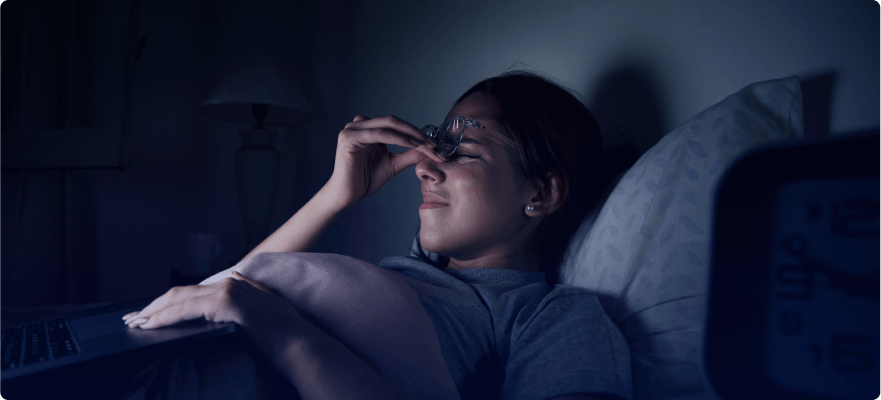Understanding Sleep Deprivation in Urban India: A Wake-Up Call for Better Health and Balanced Living
Sleep. Seemingly simple, yet in the urban context of modern India, increasingly elusive. From Mumbai’s restless streets to Bengaluru’s pulsing tech corridors, sleep deprivation has become an under‑acknowledged public health concern. Steeped in hustle culture, digital distractions, and socio‑economic pressures, urban Indians are paying the price in ways both subtle and profound. In this post, we’ll explore why sleep deprivation is so prevalent in urban India, what consequences it brings, and how individuals, communities, and policymakers can begin to address the problem.
1. Why Sleep Deprivation Is on the Rise in Urban India
1.1 The Hustle Culture and Work Pressures
Urban centres in India are magnets for ambition. With growth in sectors like IT, finance, gig economies, and startups, professionals feel the need to always be on. Deadlines, client expectations, and overtime blur the line between day and night. Burnout and sleep deprivation become almost badges of honour. Weekend catch‑up sleep turns into a ritual rather than rest.
1.2 Rampant Use of Devices
Smartphones, tablets, and laptops are everywhere. Blue‑light emissions from screens inhibit melatonin, our sleep hormone, and disrupt circadian rhythms. Social media and binge‑watching culture stimulate the mind just when the body should be winding down. In small apartments with few “screen‑free” zones, it’s difficult to create a good sleep environment.
1.3 Noise and Light Pollution
India’s city life never really sleeps: traffic hums, horns honk, street vendors call out, and outdoors, neon lights glow long past midnight. These environmental stressors seep into our bedrooms, even when windows are closed, subtly eroding sleep quality over time. Not to mention, power outages might invite the use of generators, compounding noise issues.
1.4 Mental Health and Stress
Rampant competitiveness, societal expectations, financial strain, and anxiety about the future all weigh heavily on urban dwellers. Stress and sleep deprivation feed each other – worrying about not sleeping makes it even harder to drift off.
1.5 Commuting and Unbalanced Routines
Lengthy commutes, often two hours or more, are typical in cities like Delhi, Bengaluru, and Chennai. That translates to less time at home, a compressed evening that’s often spent juggling chores, family time, meals, and the elusive goal of rest. Sleep becomes collateral damage in the face of everything else deemed essential.
2. The Consequences & Why It Matters?
2.1 Physical Health Fallout
Sleep is a cornerstone of physical well‑being. Chronic deprivation elevates blood pressure, increases vulnerability to diabetes and obesity, undermines immunity, and can even raise the risk of cardiovascular disease. Urban patterns of poor diet, sedentary behaviour, and irregular sleep create a vicious cycle.
2.2 Mental and Emotional Strain
Forgetfulness, irritability, mood swings – the emotional toll is profound. Over time, sleep-deficient individuals may experience anxiety, depression, and impaired coping ability. Cognitive functions like attention, decision‑making, and creativity – all critical in fast‑moving urban jobs – take a hit.
2.3 Impaired Work & Productivity
Ironically, the effort to increase productivity can often backfire. Lack of sleep impairs judgment, lowers efficiency, causes more mistakes, and even leads to accidents. In a culture that values hustle, poor sleep silently undermines success.
2.4 Social and Relationship Stress
When you’re exhausted, emotional bandwidth shrinks. Family dynamics, romantic relationships, and friendships suffer. One partner’s chronic tiredness can strain harmony at home, and social withdrawal can follow.
2.5 Long-Term Societal Costs
Lost productivity, increased healthcare costs, mental health burdens, and accidents—both on roads and in workplaces, – have broader ripple effects. The stakes extend far beyond the bedroom.
3. Tackling Sleep Deprivation: Practical & Sustainable Tips
Improving sleep requires a multi-pronged approach – personal habits, urban infrastructure, workplace culture, and public awareness all play a part.
3.1 Personal-Level Remedies
- Establish a Consistent Sleep Routine
Aim for a consistent bedtime and wake‑up time, even on weekends. This anchors your body’s internal clock, gradually making sleep more automatic and restorative. - Digital Hygiene Before Bed
Try a “digital sundown.” Dim or turn off screens at least 30-60 minutes before bed. Swap scrolling for a calming activity: such as light reading, meditation, or listening to soothing music. - Optimize Your Sleep Environment
Blackout curtains, earplugs, white noise apps, and air purifiers can make a significant difference, particularly in densely populated urban areas. A cool (around 20-27 °C), dark, quiet space communicates “nighttime” to your body. - Mindful Movement and Meals
Regular physical activity, preferably in the morning or early evening, can improve sleep quality. Avoid heavy, spicy meals before bed; instead, opt for lighter options and warm, herbal drinks like chamomile or ginger. - Stress-Reduction Techniques
Breathing exercises, progressive muscle relaxation, journaling, or even brief evening walks can calm the mind. When thoughts race, jotting them down can release tension.
3.2 Workplace & Schedule Adjustments
- Promote better work–life balance
Employers can encourage realistic deadlines, avoid sending after-hours emails, and support flexible scheduling whenever possible. After all, well-rested employees perform better. - Set boundaries around digital availability
Encourage norms where off‑hours are actually off‑hours—no expectation to answer work messages at midnight. - Educational workshops
Organizations can offer sleep wellness seminars. Awareness around sleep hygiene can shift personal behaviours and mindset.
3.3 Urban and Policy-Level Initiatives
- Address noise and light pollution
City planning needs to consider “quiet zones,” especially in residential pockets. Simple measures such as enforcing limits on generator noise, using lower-emission street lighting, and incorporating sound-dampening building designs, can help. - Improve public transportation
Faster, more reliable transit can shorten commute times, giving people more evening breathing room for rest and recovery. - Public health campaigns
Governments and NGOs could raise awareness about the importance of sleep via campaigns, echoing public messaging about diet and exercise.
3.4 Leveraging Technology Responsibly
- Sleep-focused apps and devices
Apps that offer relaxing soundscapes, guided breathing, or gentle bedtime reminders can assist, but they should not become substitutes for broader habit changes. - Smart lighting solutions
Installing lights that gradually dim or shift toward warmer tones in the evening can help signal to your body that it’s time for bed. - Tele‑mental health resources
Access to counseling or therapy for stress, anxiety, or insomnia can offer deeper support, especially where in‑person resources are scarce or stigmatized.
4. How Urban Indians Can Start Sleeping Better?
Sleep deprivation might feel like an unavoidable part of modern life, but it doesn’t have to be. While we can’t always control the traffic, the deadlines, or the noise outside our windows, we can build habits and environments that support better rest. Here’s how:
4.1. Set a consistent sleep schedule
Your body has an internal clock, and it likes routine. Going to bed and waking up at the same time every day, even on weekends, helps regulate that rhythm. This consistency allows your brain to recognize when it’s time to power down.
4.2. Create a wind-down ritual
Your body needs signals to slow down after a hectic day. That could mean switching off screens an hour before bed, dimming the lights, taking a warm shower, listening to calming music, or reading a book. When done regularly, these small habits act as cues that it’s time to rest.
4.3. Make your bedroom a sleep zone
If your bedroom doubles as your office or TV room, your brain doesn’t associate it with rest. Aim to make it a low-stimulation space. Keep it dark, cool, and quiet. Use blackout curtains, turn off bright lights, silence unnecessary notifications, and if needed, try white noise or an eye mask.
4.4. Be mindful of what you eat and drink
Heavy meals late at night, caffeine after sunset, or sugary snacks can all disrupt sleep. Try to finish dinner at least two hours before bed, and choose light, non-spicy meals that digest easily. If you need something before bed, opt for a glass of warm milk or herbal tea like chamomile.
4.5. Limit screen time after dark
This one’s hard, but important. The blue light from screens delays your body’s sleep hormone. Try to avoid phones, laptops, and TVs for at least 30 to 60 minutes before sleep. If you must use them, consider installing a blue light filter or using “night mode.”
4.6. Move your body, but at the right time
Exercise helps improve sleep quality, but timing matters. Morning or early evening workouts are ideal. Intense physical activity right before bed can leave you feeling more awake than tired.
4.7. Don’t bring work to bed
When work follows you into your resting hours, it becomes difficult to disconnect. Establish a clear mental and physical boundary between work time and sleep time. Let your bedroom be a no-work zone.
4.8. Address stress, don’t just suppress it
If your mind races the moment your head hits the pillow, it’s worth paying attention. Try journaling before bed to offload thoughts, or use guided meditation apps focused on sleep and relaxation. Don’t hesitate to seek help from a counselor counsellor or therapist if anxiety or overthinking is a regular issue.
4.9. Rethink the commute
If long travel times are stealing your rest, consider exploring options such as hybrid working, carpooling, or adjusting your work hours (if your employer allows it). Even saving 30 minutes a day can create space for better routines.
4.10. Talk to your workplace about sleep culture
A culture that respects personal time is a healthier, more productive one. Advocate for no-meeting zones during off-hours, flexible timings, or even sleep wellness programs. Change starts when someone brings it up.
4.11. Seek medical help if needed
If you’ve tried everything and still struggle to sleep, it’s time to consult a doctor. Conditions like insomnia, sleep apnea, or chronic stress might be interfering with your rest in ways that need medical attention.
4.12. Use technology as an ally, not an addiction
There are plenty of tools that can support better sleep: smart lights that dim gradually, apps that guide you through breathing exercises, and wearables that track your sleep cycle. Just don’t let the tech keep you up longer than necessary.
Sleep deprivation in urban India isn’t simply about poor habits; it’s a reflection of broader societal dynamics, including ambition, infrastructure shortfalls, perpetual connectivity, and a stress culture. But the road to better sleep isn’t unattainable. With changes at personal, workplace, and policy levels, restful nights can become more than just weekend catch‑ups or lucky exceptions.
Ultimately, sleep isn’t a luxury, it’s a silent ally. It fuels creativity, patience, physical resilience, emotional balance, and productivity. And in cities where the pace is fierce and the stakes high, a good night’s sleep might just be our most powerful edge.
Designed by Freepik











